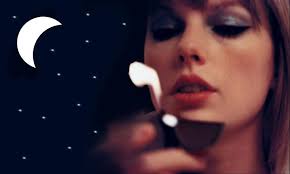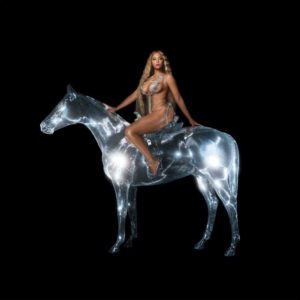#11 LECTURING AND ADMIRING THE DIVAS: A Review of Swift’s Midnights and Beyoncé’s Renaissance

Two divas who reign currently over the global pop world—Taylor Swift and Beyoncé—released major records this year. Both rocketed into music as teen phenoms; both eventually wrested complete managerial, fiduciary, and aesthetic control into their own hands, and they’ve both flourished. No one tells them what to do. They choose the other artists they want to work with. They make their music purely on their own terms and to their own visions. No small accomplishment for any artist, especially one aimed at appealing to millions.
And, I’ll add, they also cast their images as global models for couture, style, and brand.
I haven’t attempted a music review since my high school paper back in the 70’s. I recall doing the Ramones’ first album and Black Sabbath’s Sabotage (two positive notices!). It’s easy to be snarky as a music reviewer; you get to equalize yourself momentarily with people who might as well live on another planet, they’re so awash in money, glamour, and effusive talent (I mean the divas, not the Ramones).
However, we’ll start with some Buddhist crankiness about self-consciousness in art.
There’s a song on Adele’s 30 (2021) that bugged me enough that I have trouble listening to the rest of them: “My Little Love.” Whatever its merits, the snatches of confessional conversation that thread through it spill out her neuroses like you’re sitting with her on her shrink’s couch. Would it kill her to make it into art?
To Swift’s credit, she does this very thing on Midnights with her song “Anti-Hero.” As a self-proclaimed confessional writer, she confesses her egotistical self-absorption, owns it, and leans into the chorus:
It’s me
Hi
I’m the problem, it’s me
It’s me
Hi
I’m the problem, it’s me…
Everybody agrees
Everybody agrees
This song has gone to number one on the Mediabase pop radio chart. I’m not sure how I feel about her getting the world to all sing along: “It’s me, Hi, I’m the problem, it’s me,” over and over, but of course, it is catchy. The more miserable the me is, the more ensconced in me one becomes. But at least I don’t feel like throwing up, so maybe art triumphs here.
Beyoncé takes the self-empowerment tack and celebrates herself. She’s “unique,” she’s “one of one,” she “number one.” Her “category: bad bitch.” Hip-hop has made this bragging self-importance routine and obligatory, but then she comes across as doing a daily affirmation out of self-help books:
Comfortable in my skin
Cozy with who I am
Comfortable in my skin
Cozy, cozy…
I love myself goddamn
I had no problem believing that until she insists on repeating it over and over, and suddenly I trust her a little less each time. Just be it; stop fucking telling me about it. That’s good advice, in art and in life.
There, I’ve lectured the diva. Maybe I’m only quibbling with all of this, as they otherwise have both achieved something here.
Swift shines as the superlative pop lyricist of her generation. Whatever topic she turns her attention to, she finds its essence, captures it cleanly in image-selection and turns of phrase. “Lavender Haze”:
All they keep asking me
Is if I’m gonna be your bride
The only kinda girl they see
Is a one night or a wife
The music here recalls most the quieter songs on Lover—predominately synthesizer with drum machine rhythms, abandoning the Folklore/Evermore acoustic sound. It does not sound like 1989 or Reputation, as some critics have it. We’re in a more reflective, atmospheric space; it’s not club music. Nothing here is more atmospheric than “Snow on the Beach,” the shimmering highlight of Midnights:
And it’s like snow on the beach
Weird but fuckin’ beautiful
Flying in a dream
Stars by the pocketful
You wanting me
Tonight
Feels impossible
But it’s comin’ down
No sound, it’s all around
Like snow on the beach
The descending vocals at the end become the snow falling, like the relationship that’s a-glimmer and glittering elusively in the magic darkness. “Bejeweled” achieves something similar, but in the service of angry self-assertion in the face of romantic diffidence. She affirms self-worth over piping synth:
Best believe I’m still bejeweled
When I walk in the room
I can still make the
whole place shimmer
Which sets up the hilarious put down:
And when I meet the band
They ask, “Do you have a man?”
I could still say, “I don’t remember”
The music sparkles with her confidence–as the best revenge. Even more angry in “Vigilante Shit,” she states with viperous quiet:
I don’t dress for women
I don’t dress for men
Lately I’ve been dressing for revenge
One can only imagine what kind of outfit she’s putting together, and to what purpose. The slow burning menace of this song gets enacted mostly with solo voice and spacious beats. She explains both vividly and ascerbically:
While he was doing lines
And crossing all of mine
Someone told his white collar crimes to the FBI
Swift’s forte is the romantic pop song. She can write wonderfully on other subjects, like the death of her little brother (“Ronan”), a rebellious heiress (“The Last Great American Dynasty”), or arriving in the big city to live (“Welcome to New York”), and so on, but it’s always been romantic territory that she’s charted through unending nuance, from complete wondrous entrancement to bone marrow bitterness, and done so brilliantly at a high level for what seems like hundreds of songs, many of them enormous hits.
So it’s a little startling but still seems inevitable that, after all the crushes, high profile romances, sub-romances, agonizing break ups and rending disappointments, spiderlike machinations, betrayals, all of it, at 33 she comes to view it as a “Labyrinth,” singing slowly, somewhere between exhaustion and the anguish that it’s actually happening:
Uh oh, I’m falling in love
Oh no, I’m falling in love again
When she’s riding out this chorus at the end of the song, and all the elegiac, dark of night synthesizers swell around her voice, you don’t hear any countervailing notes of hope, no intimations of the sunlight that love’s expected to bring. It just dissolves away into the deep space of moody cogitation.
It’s a curious fate she’s concocted for herself, inasmuch as she’s been epically/epochally successful with recording love songs, most drawn from her own relationships, that she ends up facing the conundrum of how slippery and impossible romance and relationship can be, despite all the ecstatic moments that might bestow. And though she is that romantic down to her DNA, she’s too keenly intelligent not to see through its illusions—and live that out in front of her global audience.
“Mastermind,” the concluding cut, describes her pulling all the strings she can to bring about love, but somehow it doesn’t land so well for me as the “[Target Bonus Track]” called “Hits Different.” (There were a few choices of store outlets through which to order her recording, and more or less randomly I chose Target, hence I got the Target Bonus Track.) An electric guitar drives “Hits Different,” and the song uses bass, drums, and piano, as she belts this one out at the chorus over another romantic disaster. After all the slow to midtempo songs on Midnights (and for that matter, Folklore and Evermore), the catharsis is welcome and even uplifting.
Beyoncé’s not in Swift’s league when it comes to lyrics, but then Swift is not in Beyoncé’s when it comes to crafting songs with sheer artistic adventurousness. Her last two studio recordings, Beyoncé (2013) and Lemonade (2016) changed style and category with every track. That’s no longer the case on Renaissance. There seem to be multiple styles and categories going on within a single song.
I can’t think of any pop music so dense, so complex, as this. It would literally take me weeks breaking this down to give anything like a detailed description. Her vocals soar ballad-like over frantic tape loops and propulsive, layered shifts in percussion. Establishing a melodic verse and chorus, you may suddenly find a counter melody or a counter-chorus rising out the mix. Sometimes she sings (and here there is particular artfulness to the lyrics) with the words functioning as part of the rhythm or as their own instrument; sometimes she’s doing soft, chill rap; on another occasion her vocals trill roughly up and down the scale, expressing her appreciation for her guy; she even dives into some very distorted, out there sounding voice work–maybe some crazy improvisation she’s doing?
I know I’m not doing this justice. I can’t convey how wonderfully inventive, sonically inclusive, and relentlessly changing this music is, with its many voices running along below the surface as rhythm props, or inserting themselves center stage and disappearing. The miracle is how it all never staggers under the weight of its many ideas and experiments, but somehow remains vital and danceable all the way through.
I’ll just mention a couple of stand out cuts. “Break My Soul” has maybe the most irresistible beat on the record, over a jabbing tape loop, with soul chorus, and Beyoncé landing the fighting slogan (and I’m all in on this one): “You won’t break my soul!” The finale, “Summer Renaissance,” merges one of the few ageless classics of 70s disco, Donna Summer’s “I Feel Love,” with Bey’s own erotic ode. After about a thousand F-bombs she drops (well, maybe only 750), she sticks the chorus here on “Sexy motherfucker,” (what could be sexier than someone who copulates with their mother?) and damn, if somehow her lusty vibrato doesn’t make that seem like an excellent object of passion.
But this music is all passion and creative fire. Like you’re on top of the world, and you’ve got no reason not to go for what you want.


Gary, your introspective, interesting, and occasionally really excellent analyses have inspired me to do some thing that I have never done before, that multiple Grammys and more top tens at the same time than the Beatles hadn’t yet inspired me to do—- to see beyond and outside of my singer, songwriter, folk rock, rock ‘n’ roll…. prism of snobbery, I guess is the word, to be able to seriously, listen to and absorbTaylor Swift’s music in more than a fleeting, obligatory, and perfunctory, way. Intellectually and cerebrally I know she’s got the goods and is hella talented, across all areas of doing what she does from business to lyric, but I’ve never allowed myself to really relax enough emotionally to listen to her recent catalog; to let go, surrender, and get inside what she’s doing. To forgive her her success enough to be able to really take in her art. As both musician and music consumer. So thanks.! 😊🎶 merry Christmas and much love to you and yours!
I’m delighted that you’d give her a try. She’s my favorite pop artist of the current time, and a big part of that is the excellence of the lyrics, but she’s always appealing in her melodies, and venturesome in the places she’ll go. There’s a lot there to explore. Since I know you, recordings I’d recommend are Red and Folklore. Happy holidays to you, too!